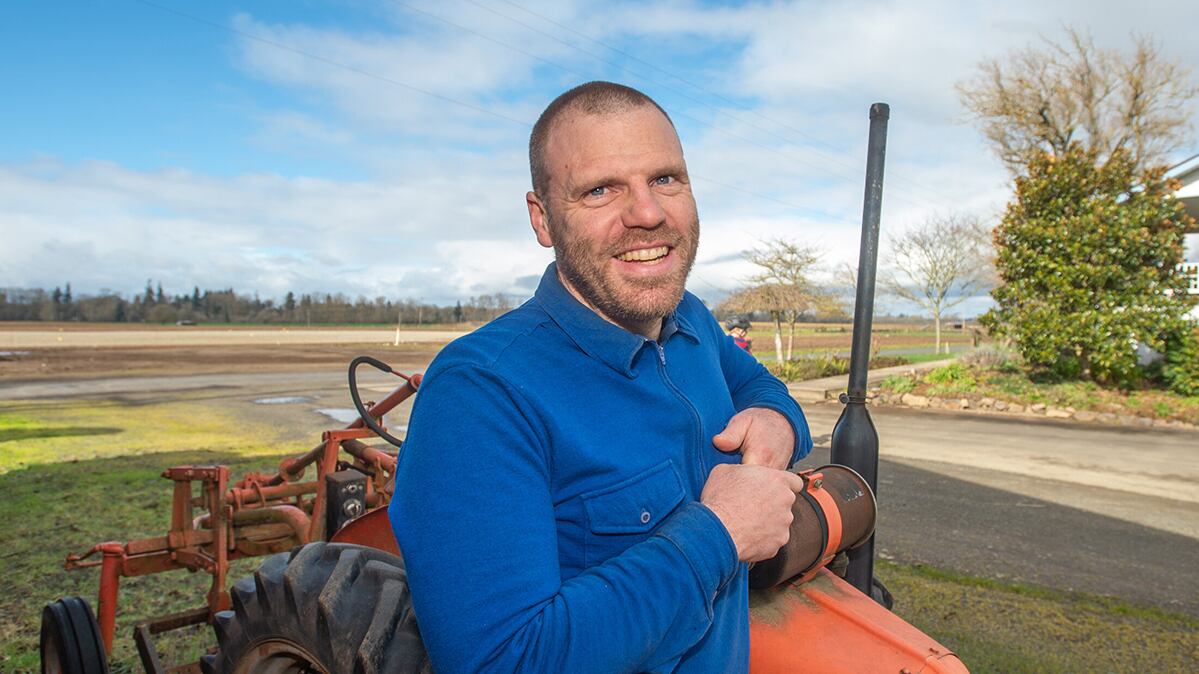Back in July, Yamhill County Commissioner Casey Kulla became the first elected official to jump into the 2022 Democratic Party primary for Oregon governor. House Speaker Tina Kotek (D-Portland) and State Treasurer Tobias Read followed.
But it’s the latest entrant, his fellow Yamhill County farmer Nicholas Kristof, who gets the biggest rise out of Kulla.
A fifth-generation Oregonian, Kulla is a homeschooling dad and cancer survivor who, along with his wife, Katie, grows a variety of crops on 17.5 acres on a Willamette River island in Dayton. He’s probably the first candidate for statewide office to film a campaign ad on a surfboard (he grew up in Lincoln City).
Outnumbered by two conservatives on the three-member Yamhill County Board of Commissioners, Kulla has found ways to be effective.
“Casey is really smart, incredibly optimistic and really dedicated to constituent services,” says Sal Peralta, a McMinnville city commissioner and co-founder of the Independent Party of Oregon.
“Yamhill County can be a difficult place,” adds state Rep. Ron Noble (R-McMinnville). “Even if we have different political ideologies, he’s still willing engage. He’s got a big heart and always follows through.”
We asked Kulla about his accomplishments, his ambitions—and his better-known neighbor.
WW: Why do you want to be governor?
Casey Kulla: Democrats work very hard to enact policies on things like climate change, housing, homelessness and addiction, but when we don’t bring the whole state along with us, we’re not going to have effective solutions. I’m a progressive Democrat in a purple, rural and exurban county. And so, every day, I work with people who have different values than me, because we all have to get to yes.
If you were elected, what would your top three issues be?
First, really addressing climate change in a comprehensive manner that’s equitable across the state. Second, addressing political violence, intimidation and bullying that’s being used to undermine democracy. And the cost of housing. Homelessness looks different in every community, but it’s there all across Oregon.
Political violence is well-publicized in the streets of Portland. What’s the situation in Yamhill County?
You’re probably aware of the Newberg School Board situation. That’s one of the versions of political intimidation. It’s part of the agenda of tearing down free public education. We have a high percentage of militia members, 3 Percenters, and Proud Boys. I had a meeting with one Proud Boy in McMinnville recently—he wanted to present his side of things about antifa and Portland.
Tell us about the Yamhelas Westsider Trail controversy.
It’s a proposal to convert an abandoned rail line into a walking and foot bicycle path between the outskirts of McMinnville and the Yamhill-Washington county boundary at Gaston. Farmers along the trail don’t want to have people adjacent to their farms. That’s the short, neutral version of a 12-year story. It’s become a political litmus test and a lightning rod in the community, and my two colleagues oppose it.
So you’re on the wrong side of perhaps the biggest, most visible issue within the county.
Well, I like to think I’m on the right side.
As a county commissioner, how would you assess Gov. Kate Brown’s handling of the pandemic?
When you look at her immediate response to COVID, we are healthier because of it. But when Gov. Brown invited feedback, rarely did elected leaders see their feedback incorporated into final policies. When you are asked for feedback and then you don’t see it incorporated into something that you have to implement in your community, that is really hard.
Give us an example.
One was around the closing of restaurants and bars and tasting rooms. Around Thanksgiving last year, a lot us said, “We need to know that there is true data showing transmission, because we want to be on your side.” We never got that data.
Tell us about your farm.
We’re on sabbatical right now, so my wife can write more and so that I can do commissioner work and campaign on a full-time basis. We still grow apples, pears, plums, cherries, and raspberries and strawberries and an array of vegetables. We have a relatively young hazelnut orchard as well. But we sold our commercial cannabis license in March.
Why should Democratic primary voters choose a newish county commissioner over Tina Kotek or Tobias Read?
When I travel around the state, I find people are looking for somebody who is out of the line of succession.
Your Yamhill County neighbor Nick Kristof fits that description. Does it bother you at all to see him steal your thunder?
Nick and I talk pretty regularly. I don’t think our state needs to have somebody who hasn’t been around a lot as governor. I encouraged him to consider running for the [new] 6th Congressional District because his ideas about the world and his global vision seem better suited to Congress. I don’t like talking ill about other people, and I really like Nick, but none of us who interacted with him on a regular basis in the past knew he was living here.
Really?
I reached out to Nick earlier this year when I learned that a mutual friend, Mike Stepp, who features prominently in his new book [Tightrope] had died. I wanted to make sure that Nick knew there was a memorial service at the bus stop where Mike spent most of his days with his friends and family from the houseless community. Nick wasn’t anywhere around.
Correction: This story incorrectly stated that Casey Kulla grew up in Newport. He was raised in Lincoln City. WW regrets the error.


